10 Best Coconut Oil Face Masks For Glowing Skin – DIY Recipes
Pair this oil with skin-enriching ingredients like coffee and aloe vera to pamper your skin.
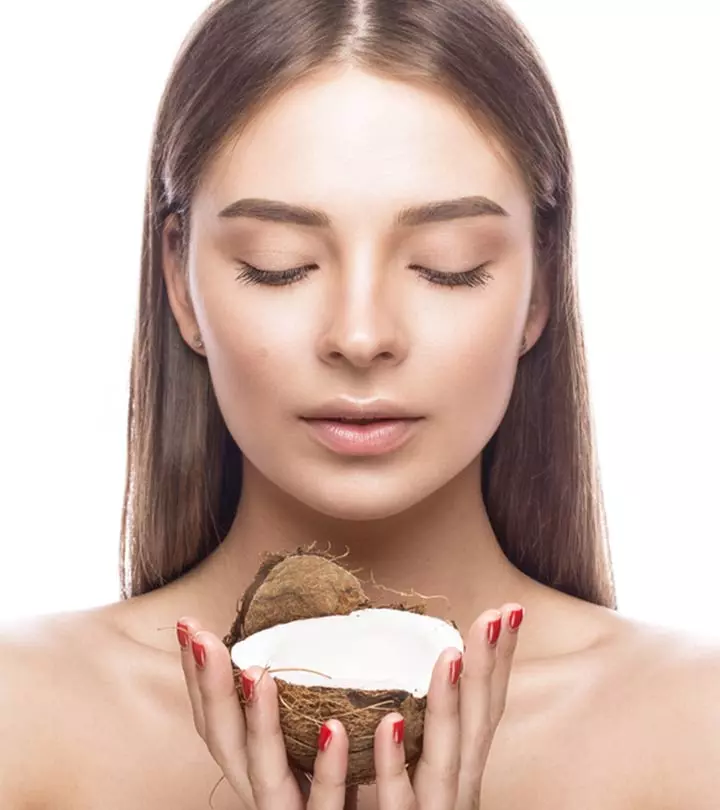
Image: Shutterstock
What’s the best makeup that you can ever wear? (Think! Think!) The answer is – healthy and glowing skin. We all love to flaunt perfect skin, and are always looking for ways and hacks to improve our skin in the best way possible. And when it comes to taking care of your skin, nothing can come close to coconut oil. Yes! I know that this is a very basic ingredient, but then, you can always find magic in the most ordinary things! And, it’s not me who’s vouching for its efficiency. It has been used in various natural remedies and traditional medicines for ages. Studies and research have found that coconut oil face masks are the best thing that can happen to your skin. Read on to learn more.
 Did You Know?
Did You Know?In This Article
Benefits Of Using Coconut Oil Face Masks
1. Coconut Oil Kills Harmful Microbes On Your Skin
Coconut oil benefits the skin in many ways and is used in many home remedies and DIY skincare routines for radiant skin. It contains lauric acid that prevents the growth of harmful bacteria. A study revealed that out of 30 types of fatty acids tested on 20 different strains of bacteria, lauric acid was found to be the most effective one in prohibiting bacterial growth.
2. Coconut Oil Is Useful In Reducing Inflammation
Any skin condition is marked by inflammation. And coconut oil has anti-inflammatory properties that can soothe your skin. A study published in the journal Pharmaceutical Biology found that extra virgin coconut oil, when used on inflamed ears of rats, not only relieved inflammation but also reduced pain.
What more? Coconut oil also improves your body’s antioxidant status by stabilizing the harmful free radicals and the reactive atoms responsible for inflammation.
3. Coconut Oil Treats Acne Effectively
If you think that coconut oil may clog your pores and worsen your acne, then think again. Because research says you can use coconut oil for acne. Laboratory results show that compared to benzoyl peroxide (used for treating acne), coconut oil is better at reducing the growth of acne-causing bacteria (as it contains lauric acid) (2).
Emorie, a blogger, shares how she uses coconut oil in various ways, and how it has replaced expensive products in her vanity. She used to struggle with teenage acne and sensitive skin, but she finally found something that worked for her. She says, “Because it is gentle, but also antibacterial, Coconut Oil is great at fighting acne…. Since I’ve been using Coconut Oil, my skin has been very happy. It is no longer dull, I have a nice natural glow and evened out skin tone. My redness and irritation have reduced drastically. And I rarely ever have to use a moisturizer anymore (i).”
4. It’s An Excellent Moisturizer For Dry Skin
Say goodbye to dry and flaky skin with coconut oil. In a controlled trial, it was found that coconut oil hydrates the skin and is equally effective as mineral oil (3). Another study published in the journal Dermatitis: Contact, Atopic, Occupational, Drug reveals that application of coconut oil reduces eczema.
So, all of you out there with dry skin – grab your bottle of coconut oil today!
5. It Facilitates Wound Healing
Virgin coconut oil can heal wounds. A study published in the journal Skin Pharmacology and Physiology claims that application of virgin coconut oil improved the antioxidant status of the skin and increased the levels of collagen (a skin protein that heals wounds).
6. It May Protect From UV Damage
Coconut oil, renowned for its versatility, extends its benefits to addressing UV damage and soothing sunburned skin. Prolonged exposure to UV radiation from the sun may lead to sunburn and accelerate premature aging, causing skin damage. However, applying coconut oil topically may serve as a protective shield, effectively mitigating the harmful effects of UV rays. Research suggests that coconut oil can block about 20% of the sun’s UV radiation (4), (5). Moreover, its moisturizing properties may aid in the healing process, reducing inflammation, redness, and peeling associated with sunburn. Incorporating coconut oil into your skin care regimen may provide relief and support your skin’s recovery.
Now you see why coconut oil is a darling of all those die-hard fans of natural skin care products!
A word of caution: Our skin is extremely sophisticated. We do not know how it’s going to behave or react to certain products. And that’s why it’s always better to use Virgin or Extra Virgin coconut oil for your face compared to refined coconut oil. Virgin and extra virgin coconut oil are unrefined, meaning, they aren’t exposed to chemicals. And as such, it’s safe for your skin (even for those with oily skin!). Still, before using coconut oil for the skin, it is recommended to perform a patch test to avoid any risks.
Now, I will tell you how you can include coconut oil in your regular beauty routine. Remember, when I say coconut oil, it means only virgin or extra virgin coconut oil and not those regular processed ones. So, here you go!
Key Takeaways
- Coconut oil face packs may help nourish your skin and improve overall skin health due to their anti-inflammatory and antibacterial nature.
- Combining extra virgin coconut oil with natural ingredients like honey, turmeric, or coffee may help you achieve moisturized and glowing skin.
- Try mixing coconut oil with other anti-acne ingredients such as tea tree oil, aloe, vera, and cinnamon for clear skin.
- A coconut oil, lemon, and yogurt face pack works best for oily skin and may help reduce marks and blemishes.
Coconut Oil Face Masks For Glowing Skin
- Coconut Oil And Honey Face Mask For Radiant Skin
- Overnight Coconut Oil Face Mask For Clear Skin
- Turmeric And Coconut Oil Face Mask For Skin Lightening
- Coconut Oil And Baking Soda Face Mask For Blackheads
- Coconut Oil And Coffee Face Mask For Glowing Skin
- Coconut Oil And Aloe Vera Face Mask
- Coconut Oil And Cinnamon Face Mask For Acne
- Coconut Oil And Oatmeal Face Pack
- Coconut Oil, Lemon, And Yogurt Face Mask For Oily Skin
- Coconut Oil And Avocado For Younger Looking Skin
DIY Coconut Oil Face Mask Recipes For Different Skin Issues
Discover the magic of DIY coconut oil face masks! Perfect for addressing various skin issues such as dryness, acne, or dullness, these natural recipes combine the nourishing power of coconut oil with other ingredients for radiant, healthy skin.
1. Coconut Oil And Honey Face Mask For Radiant Skin
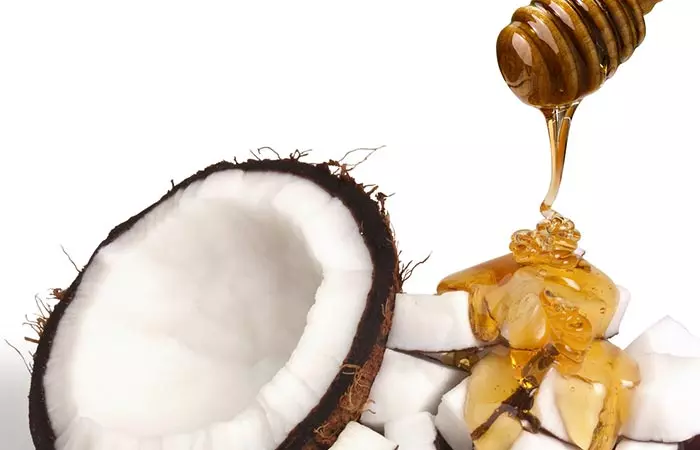
You Will Need
- ¼ cup coconut oil
- 1 tablespoon raw honey
- ¼ cup shea butter
What You Need To Do
- Take a bowl and add the shea butter and coconut oil. Melt them.
- Remove from the flame and add the raw honey.
- Mix well and apply to your entire face.
- Keep it for at least half an hour, and then wash off.
How Often You Should Do This
If you have dry skin, use this once every day (otherwise thrice a day)
Why This Works
Coconut oil, honey, and shea butter moisturize your skin and unclog the pores. Coconut oil and honey have antimicrobial and antifungal properties that eliminate germs and keep your skin healthy.
Note: If you are looking for face masks for eczema, go for it.
Caution
Let the oil and butter cool down properly before applying.
2. Overnight Coconut Oil Face Mask For Clear Skin
You Will Need
- 1 tablespoon coconut oil
- 2-3 drops tea tree oil
Note:
In case you want to make it in large quantities and store it, add 10 drops of tea tree oil in 1 cup of coconut oil.
What You Need To Do
- Take a bowl and add both the oils to it. Mix them well.
- Store it in a bottle.
- Apply 3-4 drops of this oil mask to your face before hitting the bed.
- Massage and let it work overnight.
How Often You Should Do This
Every day (for sensitive and combination skin) or every alternate day (for oily skin)
Why This Works
Both coconut oil and tea tree oil have antiseptic and healing properties. When you sleep, your body works in repairing and rejuvenating the skin cells and other systems. And this oil mask helps further in that process, giving you radiant skin the next day.
Caution
Be judicious when using essential oil. Don’t use more than the recommended number of drops.
Note: In case you want to make this in large quantities and store it, add 10 drops of tea tree oil to 1 cup of coconut oil. Also, you may explore more overnight face mask recipes to keep your skin hydrated.
3. Turmeric And Coconut Oil Face Mask For Skin Lightening
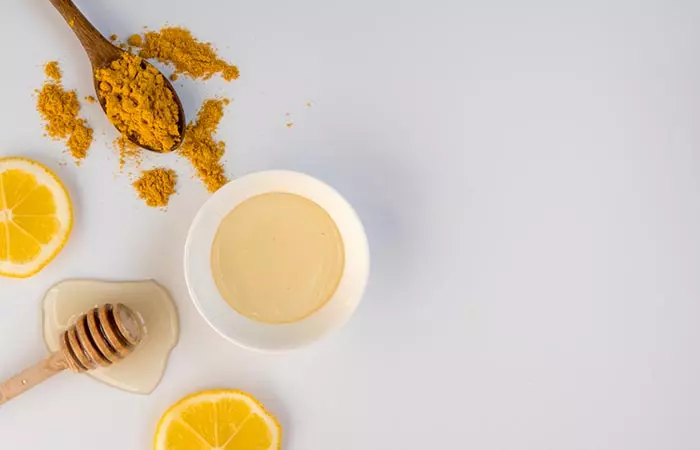
You Will Need
- 3 tablespoon coconut oil (melted)
- ½ teaspoon turmeric powder
- ½ teaspoon lemon juice
- 1 tablespoon honey
What You Need To Do
- Get a small bowl and mix all the ingredients.
- Clean your face and apply the face mask all over.
- Keep it on for 15-20 minutes, then wash.
How Often You Should Do This
2-3 times a week
Why This Works
Turmeric has antiseptic properties that help in getting rid of dark spots and blemishes, making your skin clear and bright. Lemon’s astringent properties keep your face blemish-free. Honey and coconut oil keep your face hydrated, nourished, and glowing. You can feel the difference with regular use.
Note: If you are looking for a coconut oil face mask for sensitive skin, then try this one.
Caution
Avoid adding too much lemon juice, especially if you have dry and sensitive skin. Use it sparingly.
4. Coconut Oil And Baking Soda Face Mask For Blackheads
You Will Need
- 1 tablespoon coconut oil
- 1 teaspoon baking soda
What You Need To Do
- Mix the baking soda and oil to form a paste.
- Apply to your skin; focus on the affected area.
- Massage it gently with your fingers for 10 minutes.
- Wash your face.
How Often You Should Do This
Twice a week
Why This Works
This face mask works like a cleanser. It eliminates the dirt and dead skin cells from the pores and brightens your face.
Caution
Don’t use baking soda if you have broken, flaky or extremely dry skin.
5. Coconut Oil And Coffee Face Mask For Glowing Skin
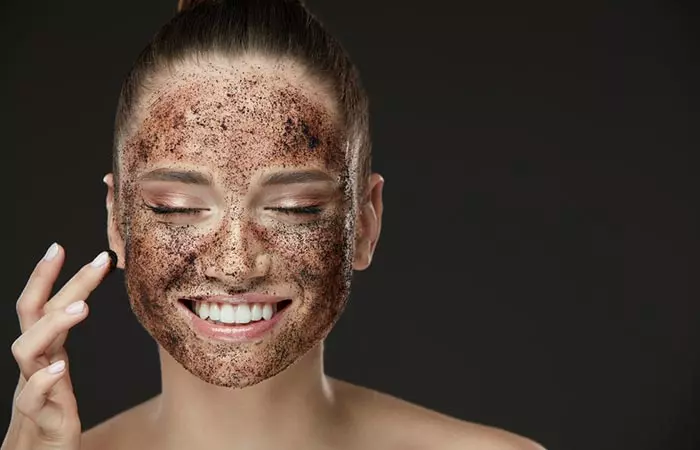
You Will Need
- 1 teaspoon coconut oil
- 1 teaspoon coffee powder
What You Need To Do
- Mix both the ingredients and make a paste.
- Apply to your face.
- Gently massage with your fingers in a circular motion for at least 10-15 minutes.
- Wash off with lukewarm water.
How Often You Should Do This
Twice a week.
Why This Works
Coffee and coconut oil are rich in antioxidants that protect your skin from harmful free radicals.
Also, they boost collagen production and make your skin glow!
Caution
Do not press too hard on your skin or massage too fast. It might damage the skin.
6. Coconut Oil And Aloe Vera Face Mask
You Will Need
- 1 teaspoon coconut oil
- 1 tablespoon aloe vera gel (extract the gel from the plant)
What You Need To Do
- Mix both the ingredients and apply it to your face.
- Gently massage your face and leave it for 10-15 minutes.
- Wash with cold water.
How Often You Should Do This
2-3 days a week.
Why This Works
Both coconut oil and aloe vera have a cooling effect on your skin. This face mask soothes irritated skin, kills acne-causing bacteria, boosts cell production, and removes age-related spots.
Caution
Nothing as such. This face pack is safe for any skin type.
7. Coconut Oil And Cinnamon Face Mask For Acne

You Will Need
- 1 teaspoon coconut oil
- 1 teaspoon organic cinnamon powder
What You Need To Do
- Mix the cinnamon powder and coconut oil to form a paste.
- Apply this pack to the affected area.
- Leave it for 30 minutes and then wash.
How Often You Should Do This
Thrice a week.
Why This Works
Both coconut oil and cinnamon have anti-inflammatory and antimicrobial properties. They work wonders for acne-prone skin.
Caution
Before applying cinnamon, do a patch test. Adjust the amount of cinnamon as per your skin’s tolerance levels. The spice might sting a bit, but that’s NORMAL!
8. Coconut Oil And Oatmeal Face Pack
You Will Need
- 1 tablespoon coconut oil
- ½ cup oats (rolled)
What You Need To Do
- Put the rolled oats in a blender and powder it.
- Take a bowl and mix the powdered oats with coconut oil.
- Make a smooth mask and apply it to your face.
- Leave it on for 15-20 minutes or until it dries.
- Wash with cold water.
How Often You Should Do This
2-3 times a week
Why This Works
Coconut oil has healing properties, and it also works like magic in killing acne bacteria. The oatmeal helps in exfoliation.
So, if you have acne prone skin and you are looking for coconut oil face masks for treating both acne and scars, go for this!
Caution
Start by using this once a week and then depending on your skin sensitivity, increase the frequency.
9. Coconut Oil, Lemon, And Yogurt Face Mask For Oily Skin
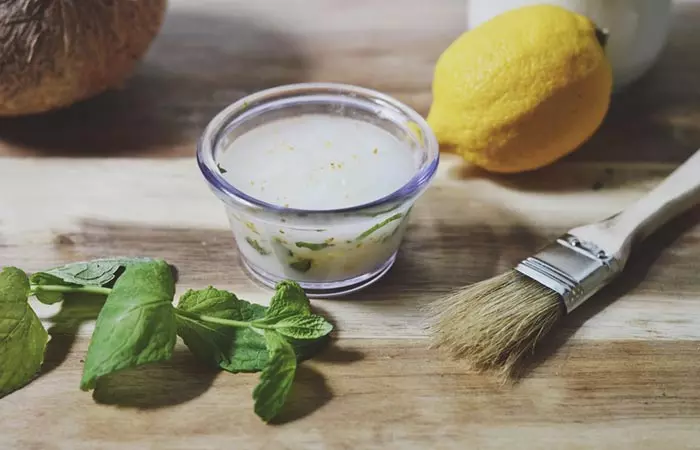
You Will Need
- ½ tablespoon coconut oil
- 1 tablespoon yogurt
- ½ tablespoon lemon juice
What You Need To Do
- Combine the coconut oil, lemon juice, and yogurt in a bowl.
- Apply the face mask evenly on your face and neck.
- Leave it for 15 minutes or until it dries.
- Wash with lukewarm water.
How Often You Should Do This
Twice a week.
Why This Works
Coconut oil and yogurt hydrate and nourish your skin and unclog the pores. Lemon has astringent properties that brighten your skin by reducing marks and blemishes.
Caution
Lemon juice is acidic, so it may cause irritation. You may adjust the quantity of lemon juice as per the tolerance level of your skin.
10. Coconut Oil And Avocado For Younger Looking Skin
You Will Need
- 1 tablespoon coconut oil
- ¼ tablespoon ripe avocado
- ½ teaspoon nutmeg powder
What You Need To Do
- Take a bowl and mash the avocado.
- Add the nutmeg powder and coconut oil to it and make a paste.
- Apply the pack on your face and leave it for 15-20 minutes.
- Wash with cold water.
How Often You Should Do This
Twice or thrice a week
Why This Works
Both coconut oil and avocado hydrate your skin and protect it from free-radicals, thus slowing down the aging process.
 Quick Tip
Quick TipInfographic: Top 5 Coconut Oil Face Masks For Radiant Skin
The secret behind a radiant glow is a nourishing coconut oil-infused face pack. Pair this wonderful plant oil with other natural ingredients to unveil rejuvenated skin. Check out the following infographic to learn more about the best DIY coconut oil face masks to achieve healthy, glowing skin. Try these out today!

Illustration: StyleCraze Design Team
Whenever your skin is giving you a hard time and you are looking for natural ways to get glowing skin, you can use coconut oil face masks. Natural facial treatments such as this mask can be as useful as getting a spa for your skin! Studies show that coconut oil is good for fighting bacteria, reducing pain and inflammation, and moisturizing your skin. Although using coconut oil for acne-prone skin may seem counterintuitive, the lauric acid present in coconut oil may be effective in killing acne-producing bacteria. You can mix coconut oil with coffee, baking soda, oatmeal, lemon, or yogurt to get radiant and healthy skin. Ensure you conduct a patch test before using nutmeg as it may cause skin irritation.
Frequently Asked Questions
Is coconut oil good for under eyes?
Yes, since the skin under your eyes is thin and makes dark circles look more prominent, coconut oil may thicken the skin barrier by increasing cell turnover. This may diminish the appearance of dark circles under your eyes (4).
Does applying coconut oil on the face increase facial hair?
No. Currently, there are no studies that suggest coconut oil stimulates facial hair growth.
Is there any disadvantage to applying coconut oil on the face?
Coconut oil’s high comedogenicity makes it prone to clogging pores and highlighting acne, blackheads, and whiteheads.
What happens if we apply coconut oil on the face daily?
The high amount of lauric acid present in coconut oil helps increase the production of collagen, which is responsible for maintaining the skin’s elasticity and firmness. Therefore, applying coconut oil daily might help to keep lines and wrinkles at bay.
What happens if you put too much coconut oil on your face?
Although coconut oil is effective at locking in moisture, some people might find it too greasy or pore-clogging to apply to their face. Using excessive amounts of coconut oil on your face or legs can result in pimples and folliculitis.
Does coconut oil reverse wrinkles?
Coconut oil and other natural remedies are not any more effective than conventional over-the-counter medicines. While you may use coconut oil for wrinkles, as it may keep the skin hydrated and minimize their appearance to a certain extent, you’ll probably need more aggressive treatments for deeper wrinkles.
Is coconut oil anti-aging for the face?
Better than other similar oils, coconut oil has beneficial antioxidants that can help delay the aging process and slow down the appearance of wrinkles.
What are the best ways to remove a coconut oil face mask?
If you want to remove a coconut oil face mask, try using a foaming cleanser.
Are there any skin types that should avoid coconut oil face masks?
Coconut oil should not be applied to acne-prone areas if you have oily skin.
Illustration: Best Coconut Oil Face Masks For Glowing Skin - DIY Recipes
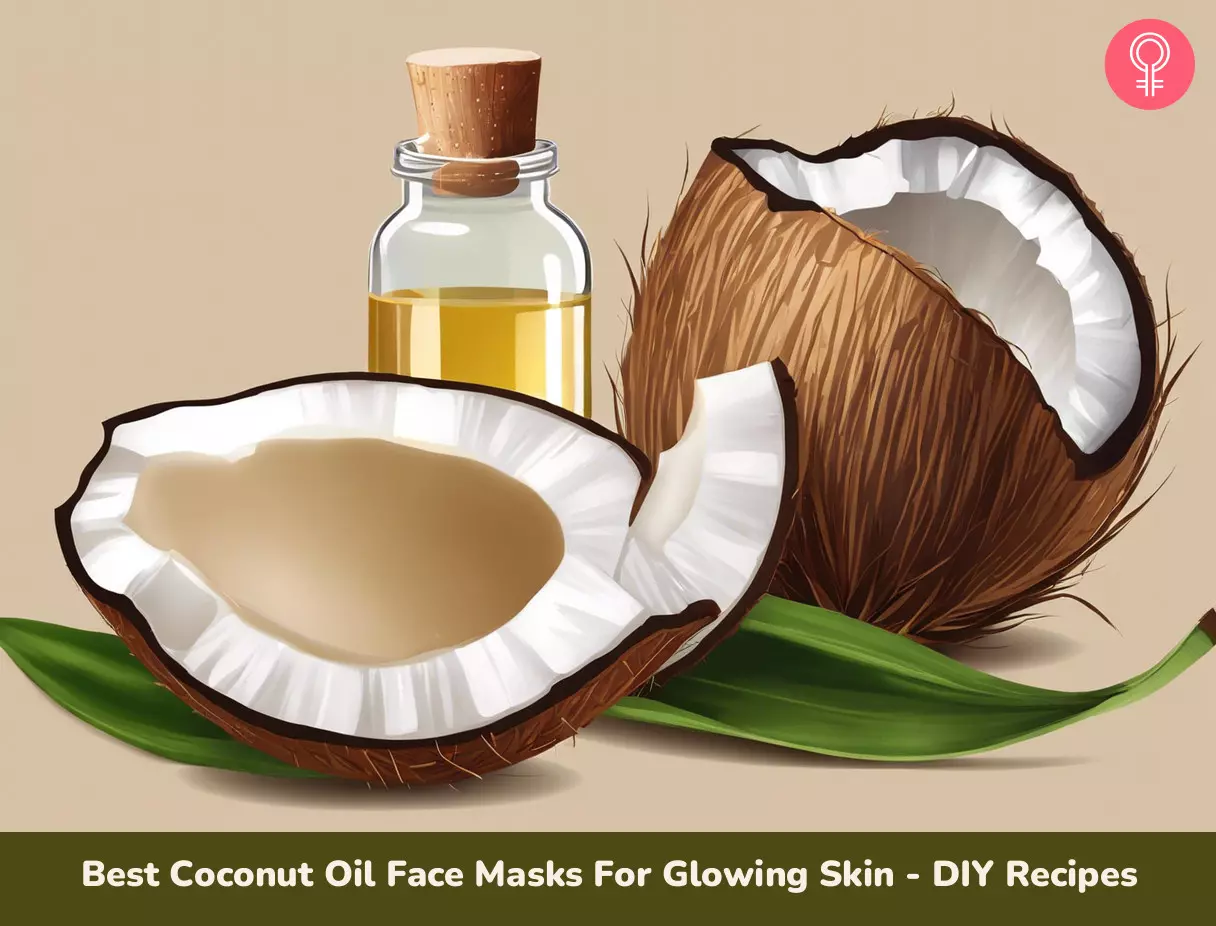
Image: Stable Diffusion/StyleCraze Design Team
Learn how to make a deep cleansing mask using coconut oil and baking soda with this easy-to-follow video! Check it out to learn more about this DIY recipe and get glowing skin in minutes.
Personal Experience: Source
StyleCraze's articles are interwoven with authentic personal narratives that provide depth and resonance to our content. Below are the sources of the personal accounts referenced in this article.
i. Natural Beauty: Coconut Oilhttps://ohwhimsicalme.blogspot.com/2013/03/natural-beauty-coconut-oil.html
References
Articles on StyleCraze are backed by verified information from peer-reviewed and academic research papers, reputed organizations, research institutions, and medical associations to ensure accuracy and relevance. Read our editorial policy to learn more.
- The Effect of Virgin Coconut Oil Loaded Solid Lipid Particles (VCO-SLPs) on Skin Hydration and Skin Elasticity
https://www.researchgate.net/publication/257298783_The_Effect_of_Virgin_Coconut_Oil_Loaded_Solid_Lipid_Particles_VCO-SLPs_on_Skin_Hydration_and_Skin_Elasticity - Antimicrobial property of lauric acid against Propionibacterium acnes: its therapeutic potential for inflammatory acne vulgaris
https://pubmed.ncbi.nlm.nih.gov/19387482/ - A randomized double-blind controlled trial comparing extra virgin coconut oil with mineral oil as a moisturizer for mild to moderate xerosis
https://pubmed.ncbi.nlm.nih.gov/15724344/ - Anti-Inflammatory and Skin Barrier Repair Effects of Topical Application of Some Plant Oils
https://www.ncbi.nlm.nih.gov/pmc/articles/PMC5796020/ - Potential of herbs in skin protection from ultraviolet radiation
https://www.ncbi.nlm.nih.gov/pmc/articles/PMC3263051/
Read full bio of Dr. Priya Gill
Read full bio of Ramona Sinha
Read full bio of Eshna Das
Read full bio of Shiboli Chakraborti





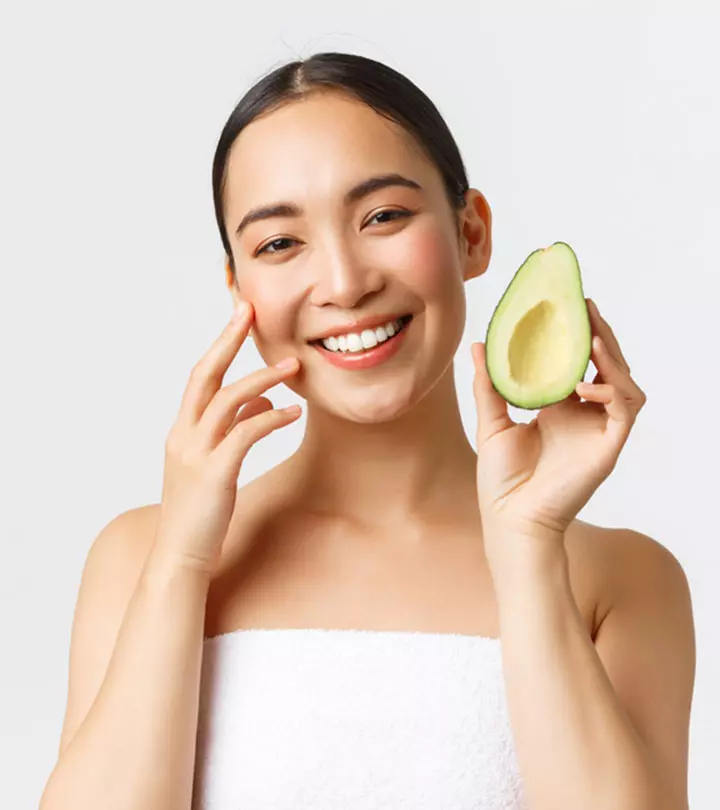
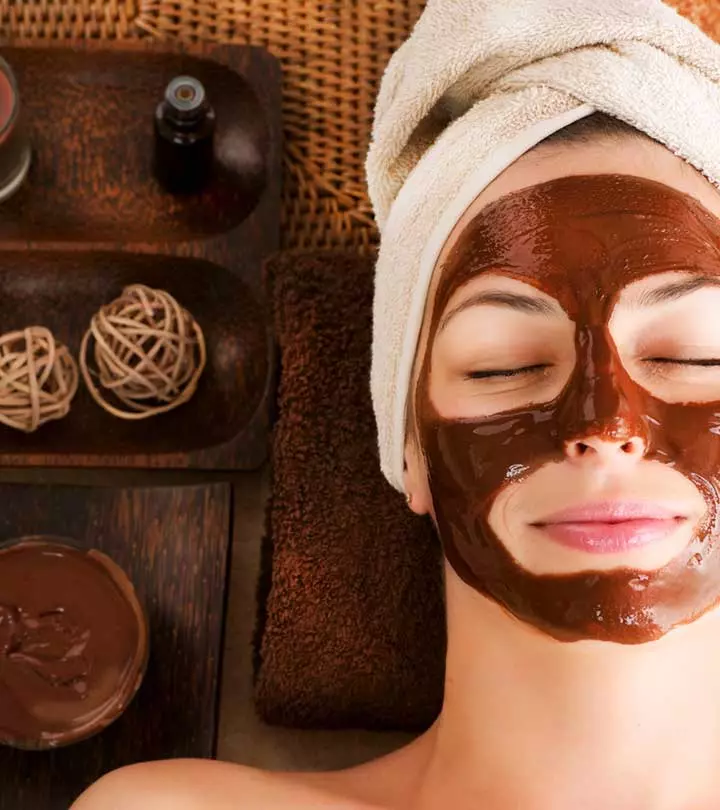


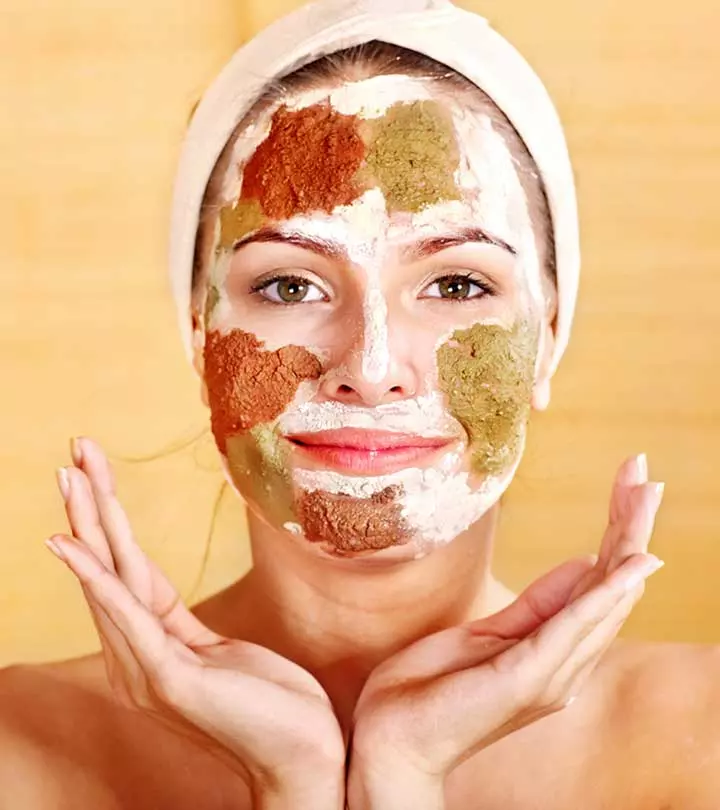
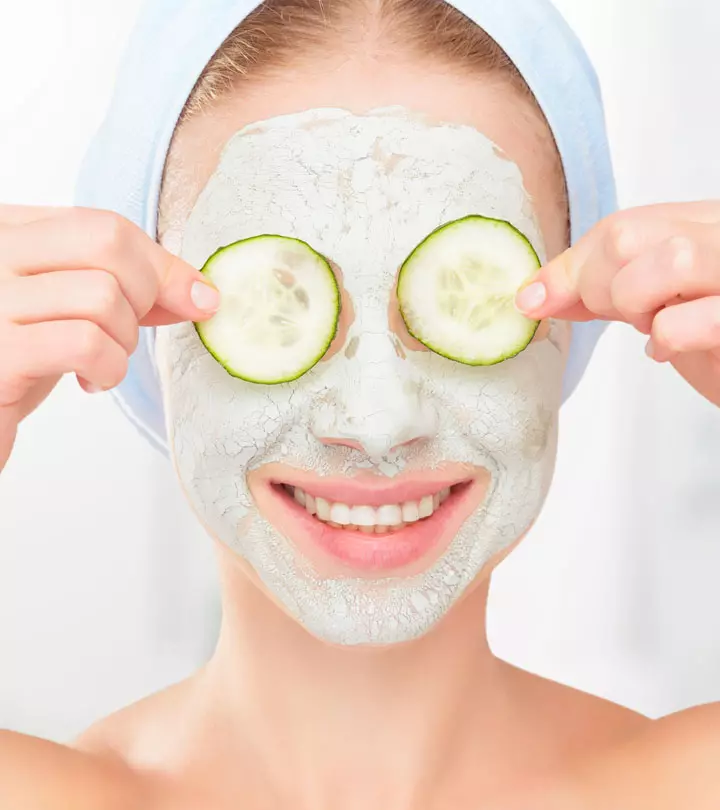



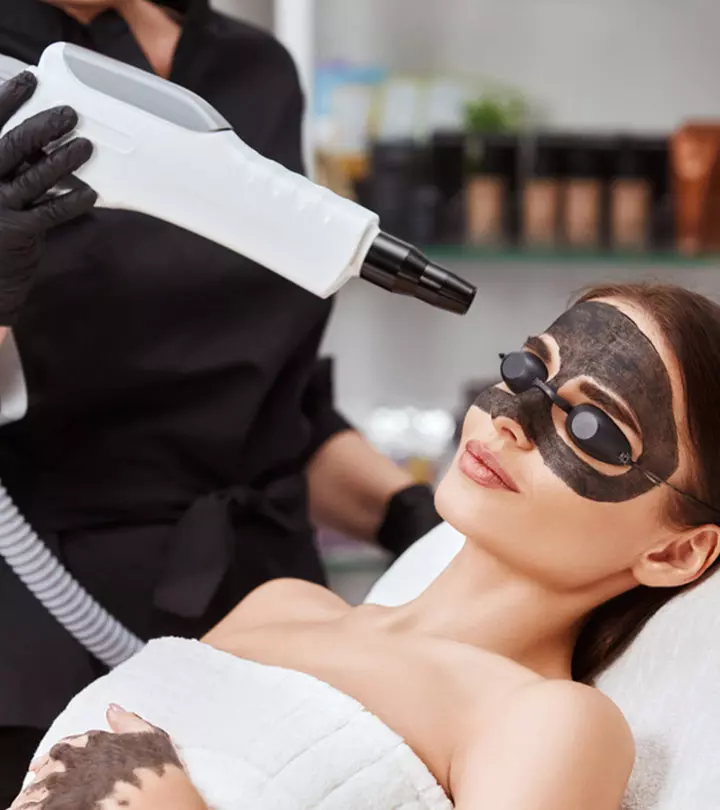
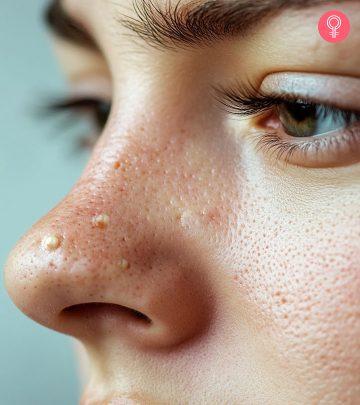
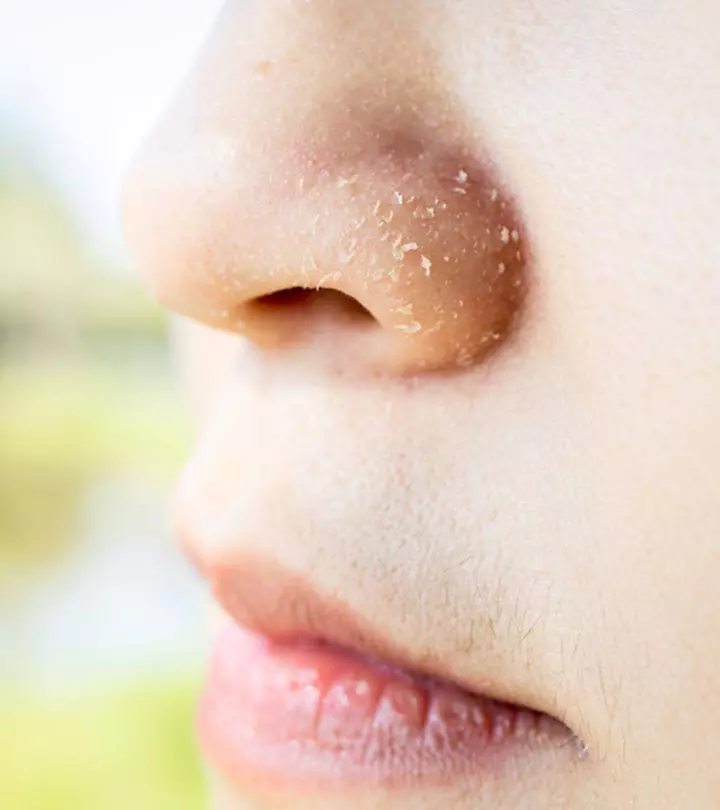


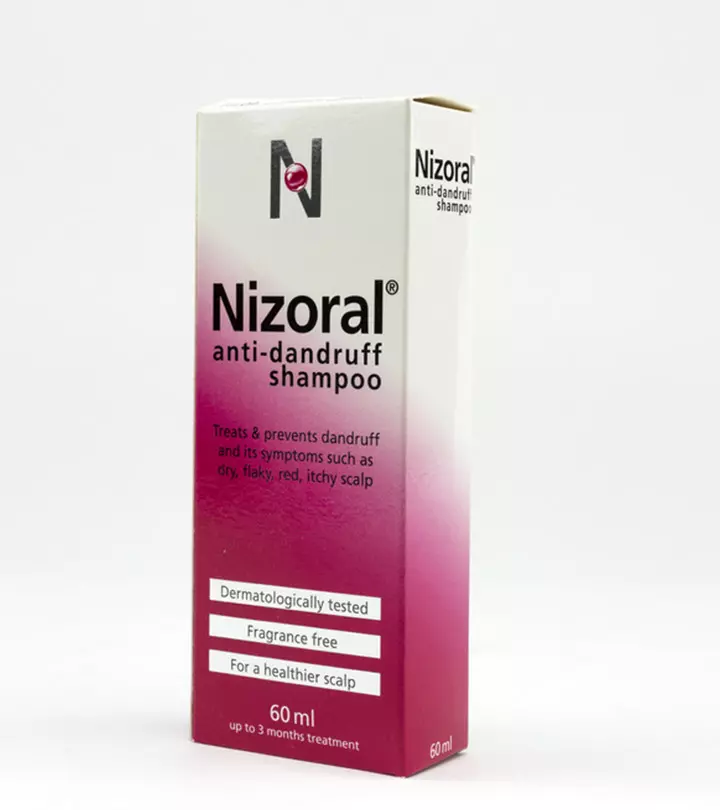


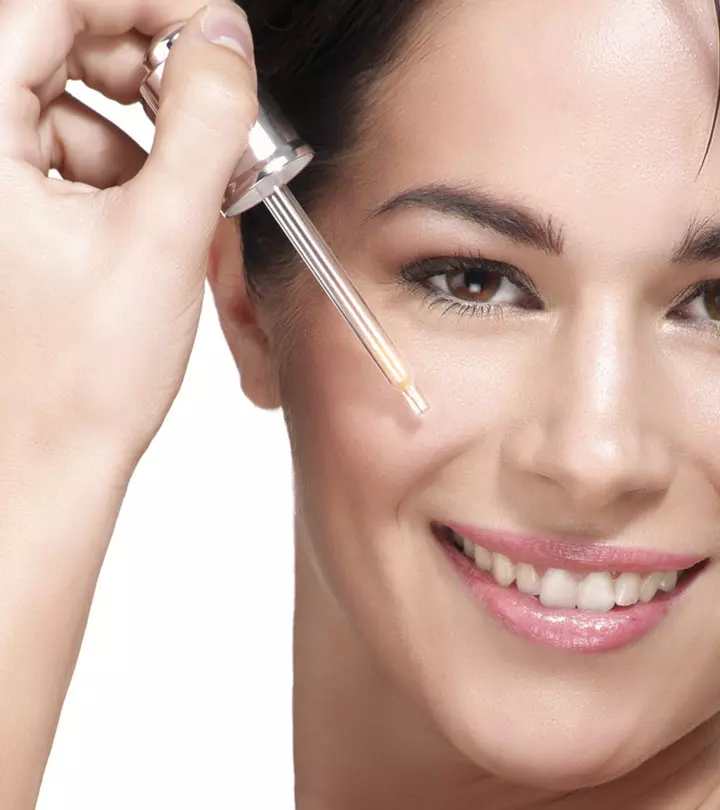

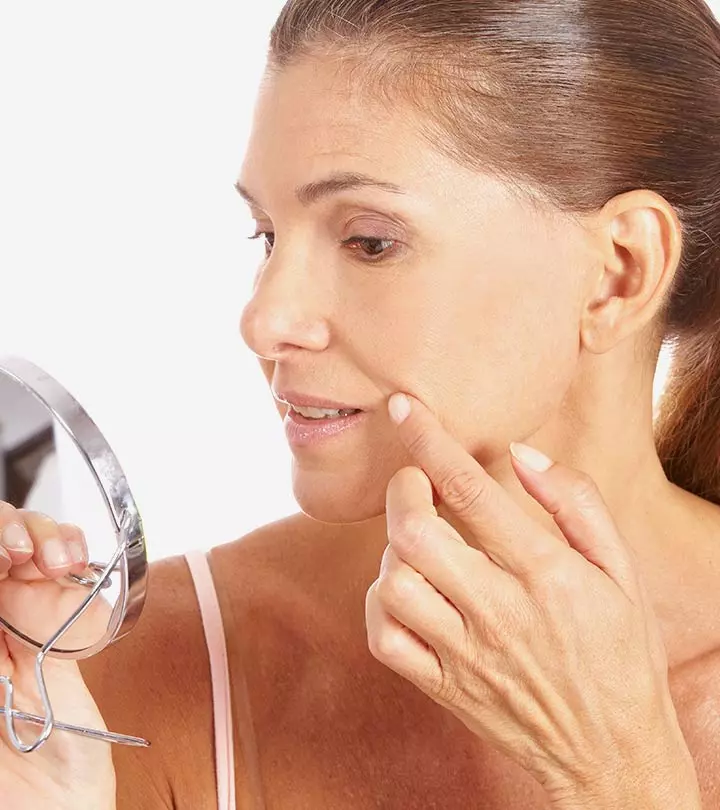

Community Experiences
Join the conversation and become a part of our empowering community! Share your stories, experiences, and insights to connect with other beauty, lifestyle, and health enthusiasts.